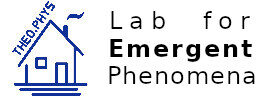Master thesis – Robert Weigel
Robert Weigel
Equilibration of Orientational Order in Hard Disks via Arcuate Event-Chain Monte Carlo
[PDF]
finished 2018-04
supervised by Sebastian Kapfer
Abstract
For hard disks in two dimensions the conventional Metropolis Monte Carlo algorithm exhibits dramatic slowing down in the vicinity of the liquid-hexatic and the hexatic-solid phase transition. An improved Monte Carlo algorithm, the event-chain Monte Carlo algorithm (ECMC), has facilitated extensive study of the hexatic-solid transition, by rapidly equilibrating positional order. ECMC is a lifted Markov-chain algorithm. It employs infinitesimal continuous-time moves, in which single particles are displaced with a constant velocity. An avalanche of coordinated single-particle displacements forms an event chain. This renders ECMC well-suited for equilibration of positional order. At the liquid-hexatic transition however equilibration of orientational order is the limiting factor, in which ECMC is still not satisfactory. In the related soft-disk model even a critical slowing down is observed, due to diverging orientational correlation length. In this work we substantially generalize ECMC, in order to couple to orientational degrees of freedom. A variable velocity is obtained in two different ways: First by the introduction of velocity changes at collision events. To this end a previously unknown, generalized formulation of the global balance condition is exploited. A valid but not viable algorithm is constructed. Second, by the introduction of turning events we construct the arcuate ECMC algorithm (ArcMC). We demonstrate the correctness of ArcMC and its capability of rotating a domain of orientational correlation. Furthermore we generalize the computation of pressure in the framework of ECMC to variable velocity and derive the distribution of collision angles to be a purely geometric property. Our analysis of correlation and mixing time with respect to orientational order reveals that ECMC, ArcMC, and the Metropolis algorithm exhibit the same scaling with the number of particles, only differing by constant factors. We find that ArcMC does not exceed ECMC in equilibrating orientational order. Finally we determine the chain displacement for ECMC to be optimal, when it is greater or equal half the free length in the system.
For hard disks in two dimensions the conventional Metropolis Monte Carlo algorithm exhibits dramatic slowing down in the vicinity of the liquid-hexatic and the hexatic-solid phase transition. An improved Monte Carlo algorithm, the event-chain Monte Carlo algorithm (ECMC), has facilitated extensive study of the hexatic-solid transition, by rapidly equilibrating positional order. ECMC is a lifted Markov-chain algorithm. It employs infinitesimal continuous-time moves, in which single particles are displaced with a constant velocity. An avalanche of coordinated single-particle displacements forms an event chain. This renders ECMC well-suited for equilibration of positional order. At the liquid-hexatic transition however equilibration of orientational order is the limiting factor, in which ECMC is still not satisfactory. In the related soft-disk model even a critical slowing down is observed, due to diverging orientational correlation length. In this work we substantially generalize ECMC, in order to couple to orientational degrees of freedom. A variable velocity is obtained in two different ways: First by the introduction of velocity changes at collision events. To this end a previously unknown, generalized formulation of the global balance condition is exploited. A valid but not viable algorithm is constructed. Second, by the introduction of turning events we construct the arcuate ECMC algorithm (ArcMC). We demonstrate the correctness of ArcMC and its capability of rotating a domain of orientational correlation. Furthermore we generalize the computation of pressure in the framework of ECMC to variable velocity and derive the distribution of collision angles to be a purely geometric property. Our analysis of correlation and mixing time with respect to orientational order reveals that ECMC, ArcMC, and the Metropolis algorithm exhibit the same scaling with the number of particles, only differing by constant factors. We find that ArcMC does not exceed ECMC in equilibrating orientational order. Finally we determine the chain displacement for ECMC to be optimal, when it is greater or equal half the free length in the system.
